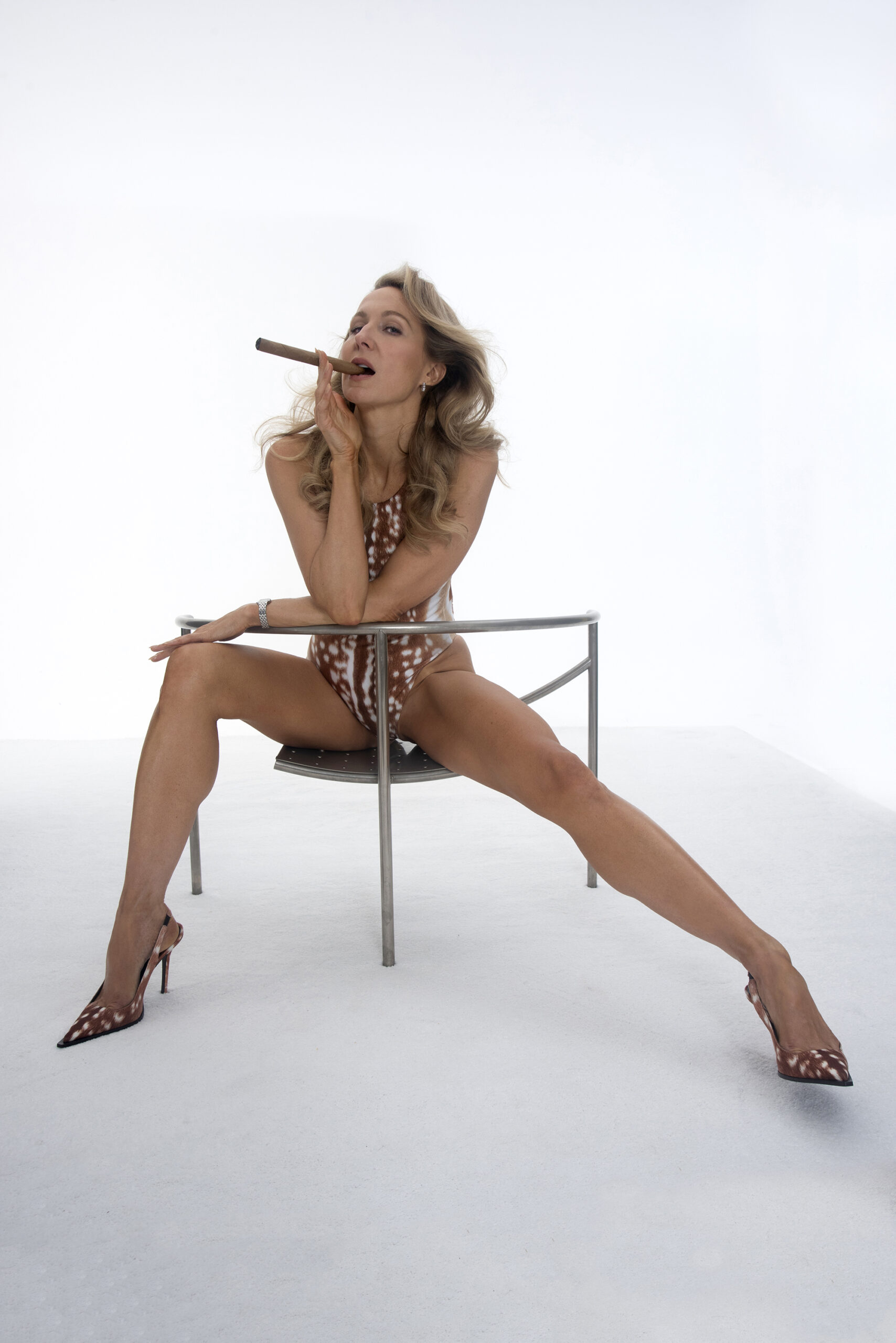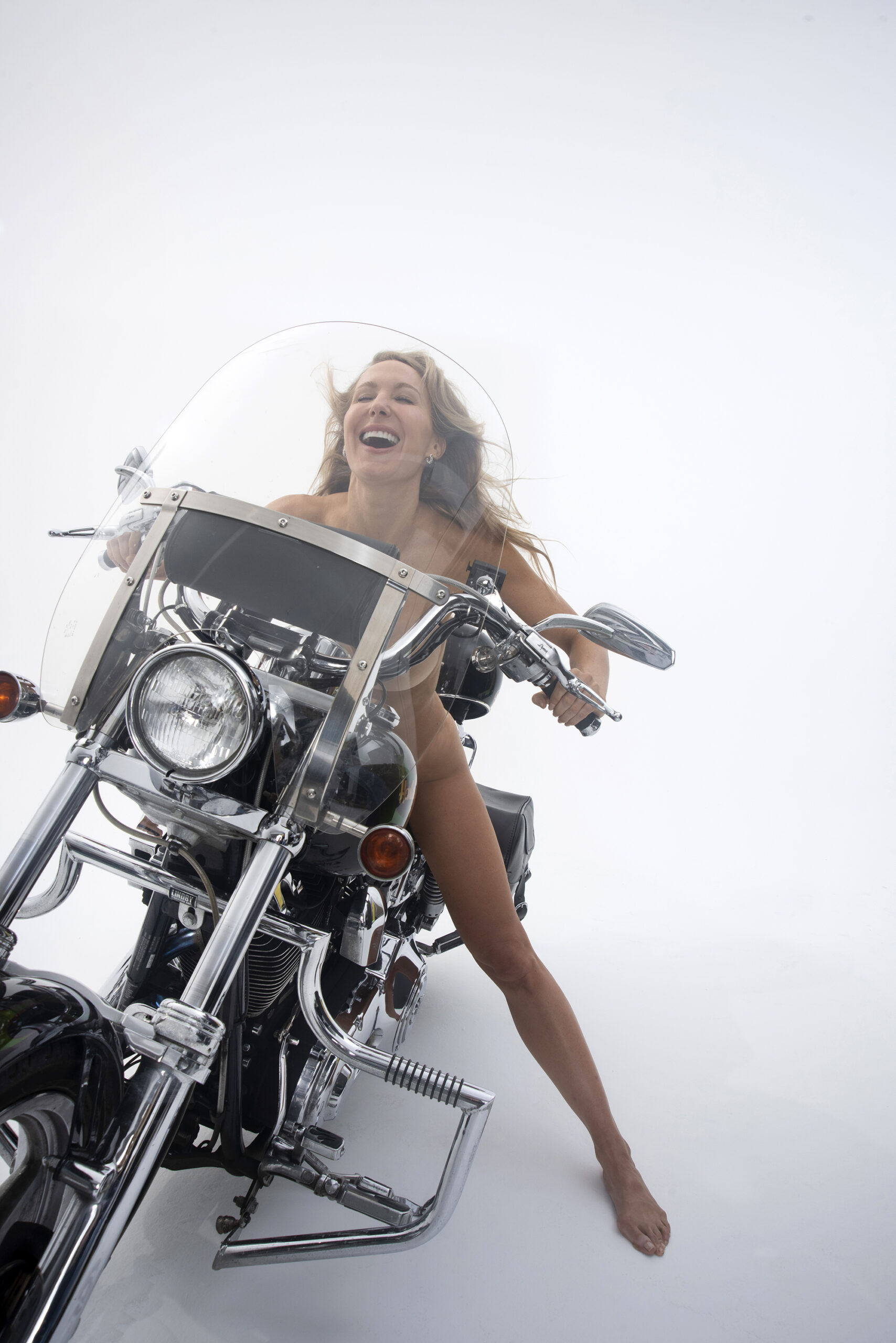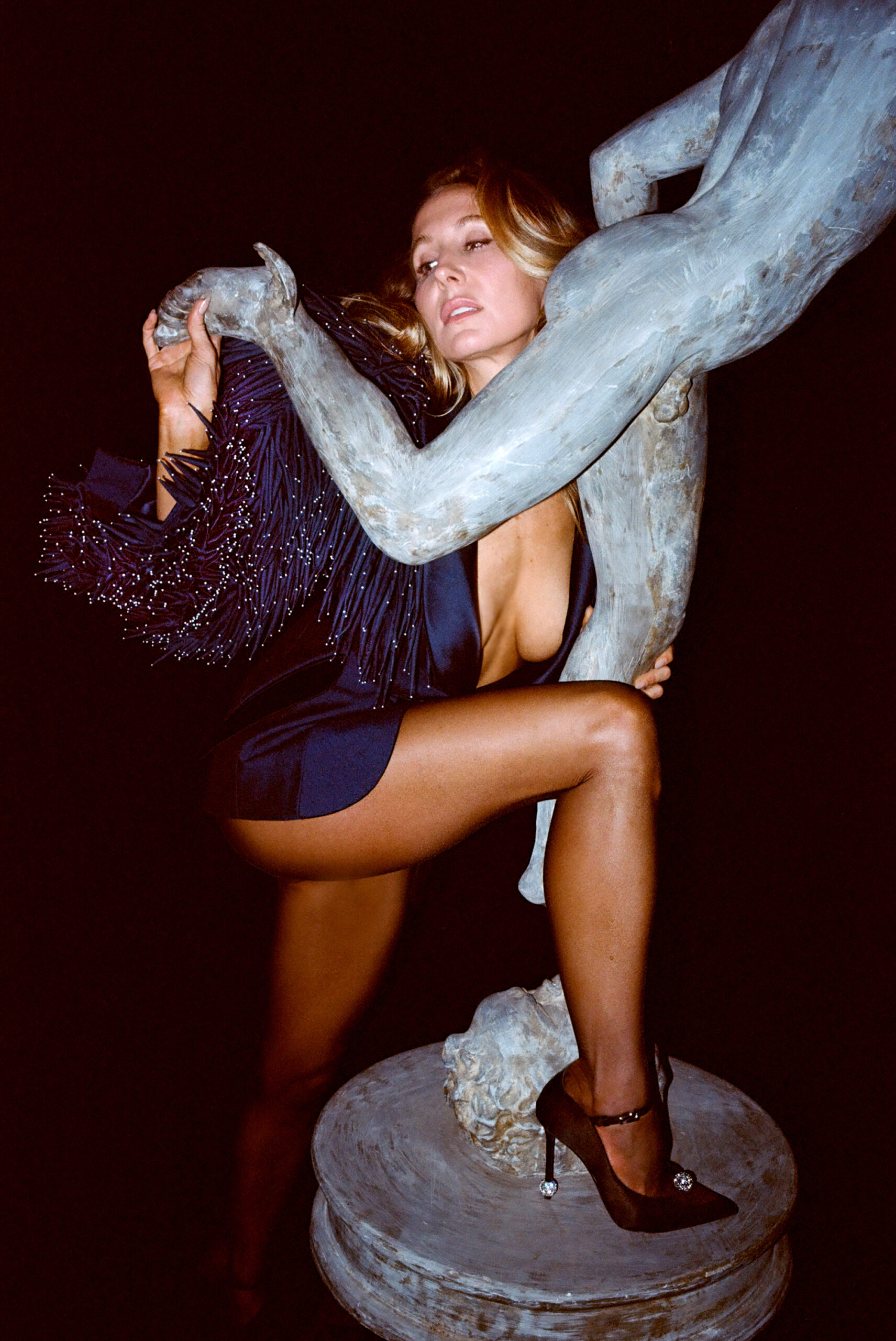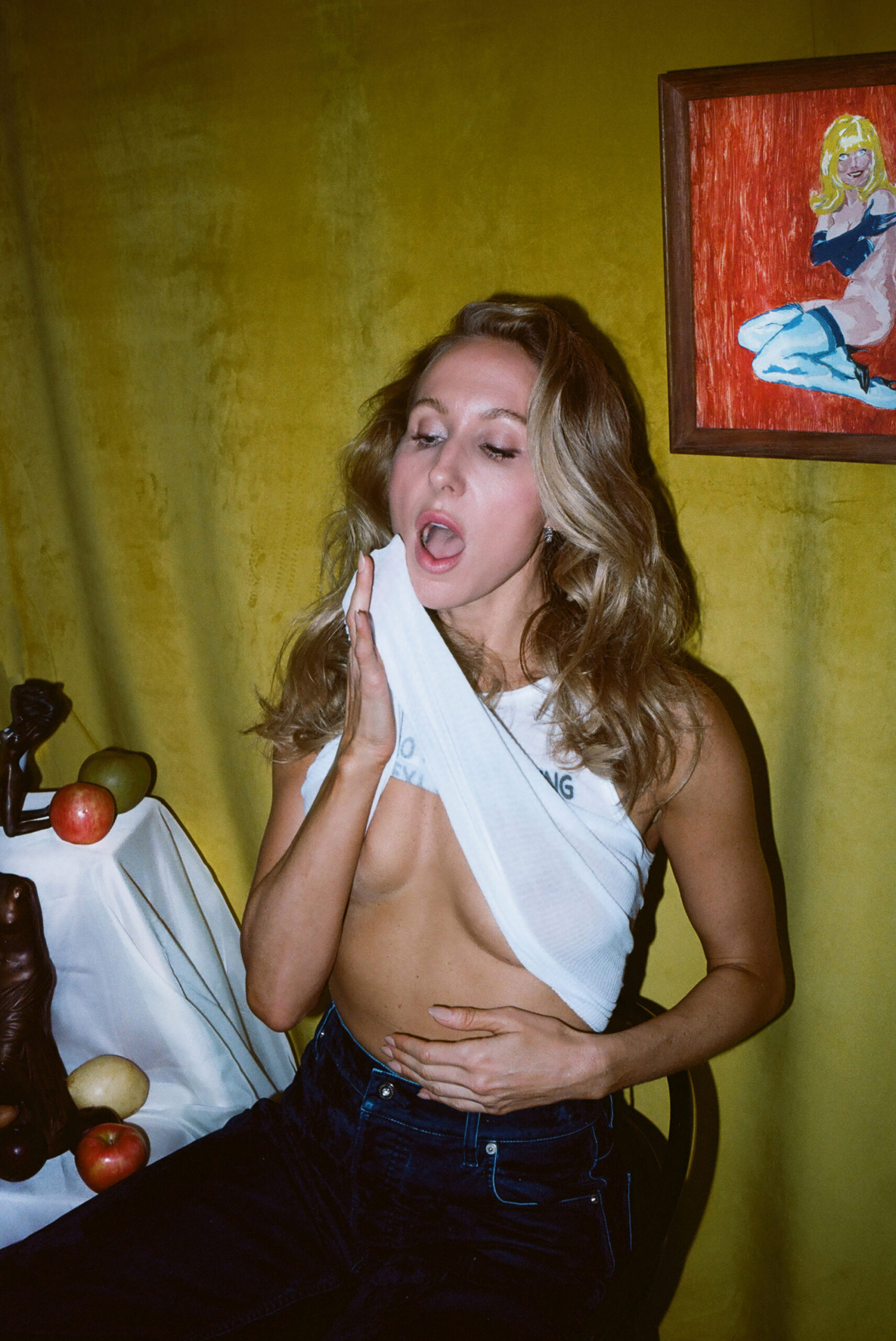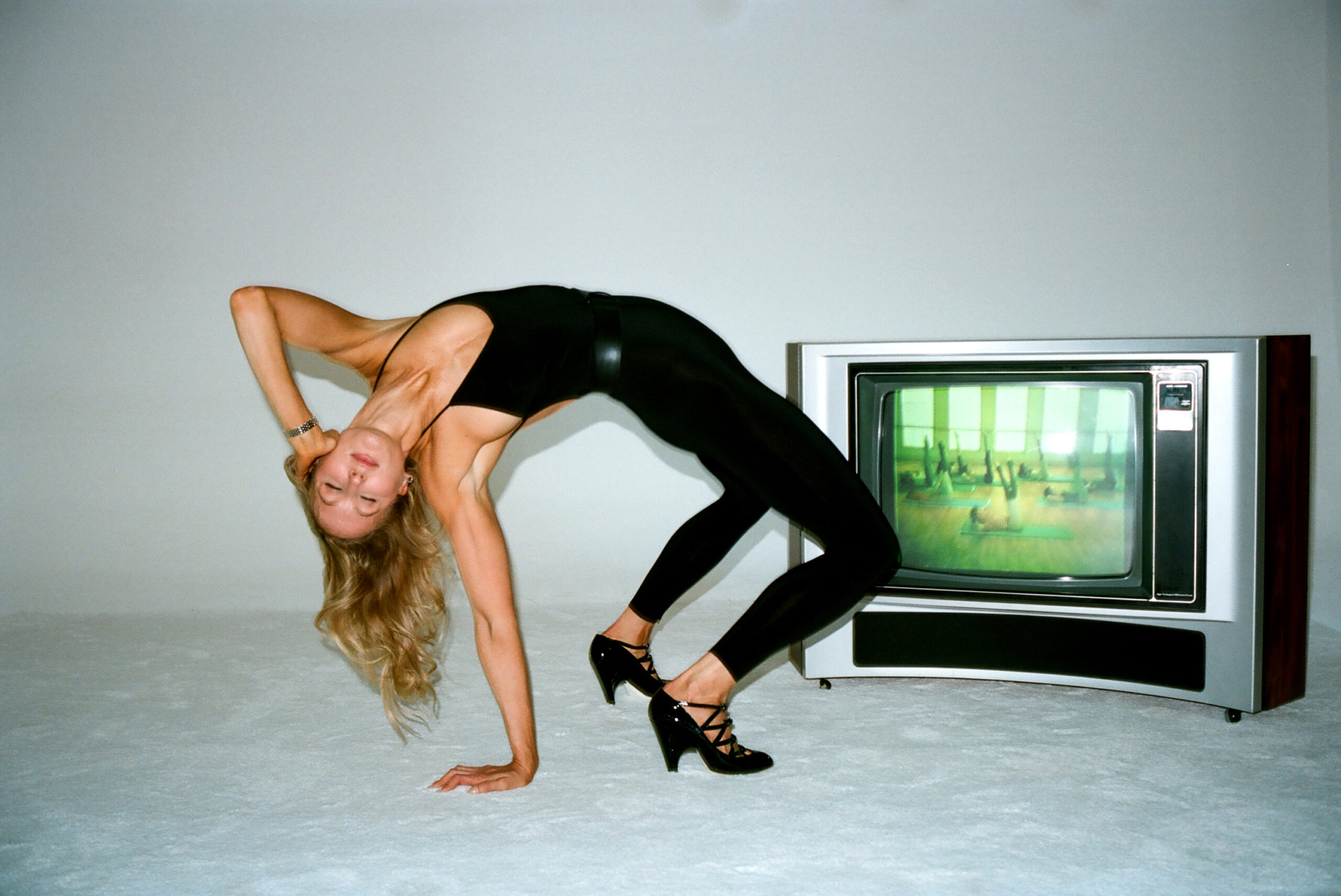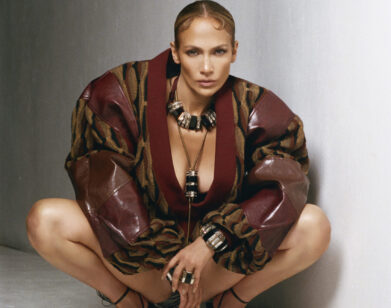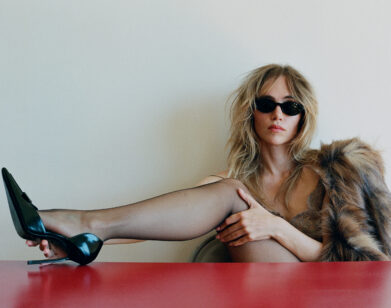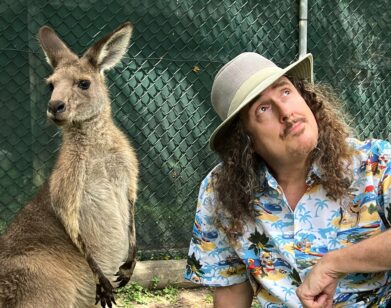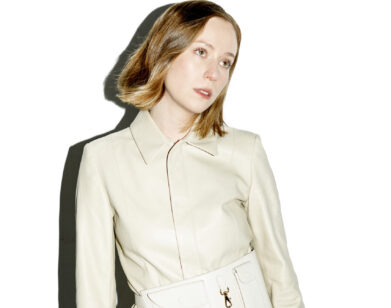JOKER
Nikki Glaser and Cara Delevingne Let It Rip
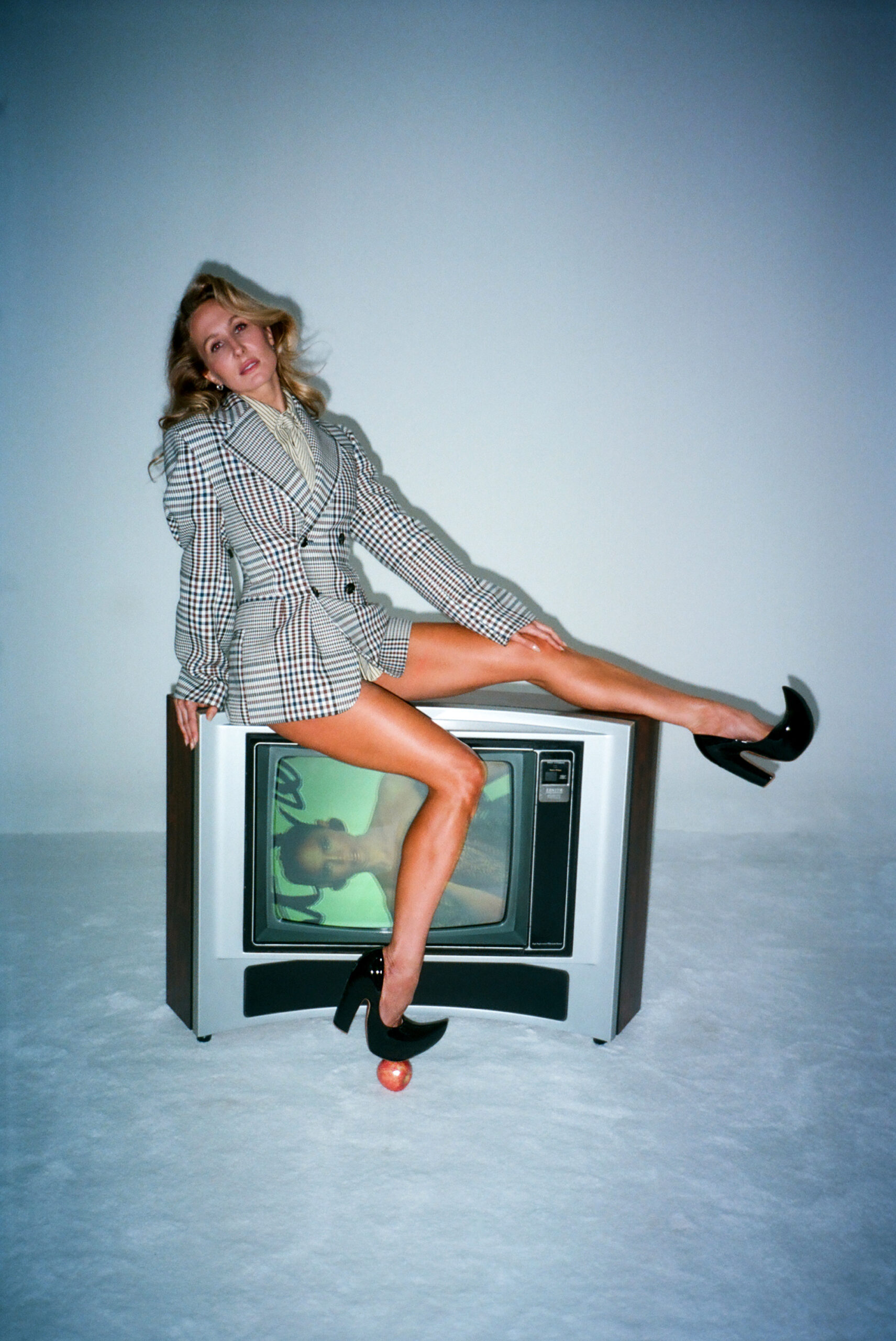
Nikki Glaser wears Jacket, Shirt, and Tie Bottega Veneta. Earrings (worn throughout) Cartier. Shoes Marc Jacobs.
Nikki Glaser isn’t new to stand-up. Over the last 15 years, she’s brought her racy act around the world while dabbling in reality TV, making cameos on shows like Selling Sunset, and hosting three seasons of FBoy Island. But it wasn’t until she showed up to The Roast of Tom Brady with an arsenal of insults that the sharp-tongued mother of none made her mark as he next big thing in comedy. Fast-forward a few months and an HBO special later, and Glaser has officially hit the big time. Shortly after it was announced that she’d be hosting the 82nd Annual Golden Globes this January, the 40-year-old comedian got on the phone with her friend Cara Delevingne, another loose-lipped Swiftie who appreciates Glaser’s willingness to dive deep into death, depression, and bodily fluids, like any self-assured woman should.
———
TUESDAY 3 PM OCT. 22, 2024, ST. LOUIS
CARA DELEVINGNE: Hi!
NIKKI GLASER: What’s up? Thank you so much for doing this.
DELEVINGNE: I’m sorry I was having animal difficulties. I have two cats and a dog.
GLASER: [Laughs] No worries. How are you?
DELEVINGNE: I’m good. It’s one of those days where you wake up and five things happen at once and suddenly you’re a bit overwhelmed. I was like, “I need to breathe.”
GLASER: Yes. I feel that way right now too. I love when something really big is going on in your life, and everything else has to shut down for it.
DELEVINGNE: That’s the best. It’s like having horse blinders on, which is nice because I get distracted by everything.
GLASER: I know, I keep my schedule packed because I don’t know what’s going to happen if I’m alone with my thoughts. I sent a screenshot of my schedule today to my group chat with all my girlfriends and they were like, “Girl, do you even have time to walk your dog?” I’m so proud of how busy I am, but at the same time it’s ruining my life.
DELEVINGNE: We’re very lucky to be able to do what we do, and there is nothing to complain about. It’s just like, “Oh no, my head is not on my body.”
GLASER: That’s exactly how I was feeling earlier today. When it all feels so insurmountable I’m like, “You aren’t you. You’re a machine today and you just need to plug in and go.”
DELEVINGNE: It’s autopilot, but not.
GLASER: Yes, you obviously can’t complain about being so busy because that means you’re working, and we make so much money for doing stuff that we—
DELEVINGNE: Like stupid.
GLASER: I’m always just like, “This is ridiculous.” And they’re like, “You deserve it, Nikki. You worked so hard to get here.” I’m like, “I did, but not harder than my sister who’s a teacher, who’s not seeing this kind of cash.”
DELEVINGNE: I have to agree with that. Obviously you cannot compare to people who are nurses or teachers. But I always say, especially in the craft of entertainment, stand-up is the hardest. Modeling is the stupidest, especially when you’re doing things like runways where you literally just put one foot in front of the other. [Laughs]
GLASER: It’s so easy to dismiss modeling. I used to do it because I was jealous of all of you because you’re all beautiful and whatever.
DELEVINGNE: But coming from someone who does it, it is funny; you can take the piss easily.
GLASER: But the truth is, I modeled last week for this story, and it’s so hard to come up with new faces.
DELEVINGNE: Were they asking you to do loads of different expressions?
GLASER: No.
DELEVINGNE: You just wanted to have different faces?
GLASER: I wanted to give more—
DELEVINGNE: Faces.
GLASER: I wanted to feel like I had options.
DELEVINGNE: Right.
GLASER: The camera comes down and you can tell that they’re like, “What else can she do?” I remember one shoot early on in my career. I could sense the photographer was so frustrated, and I go, “I’m sorry, I’m not a model.” And he goes, “Urgh.” But people don’t understand that with modeling, you have to pay attention to what your fingers are doing, what your ankle is doing—your angles. It reminded me of stand-up in the sense that I’m sure it all comes naturally once you’ve been doing it a while and you watch yourself and [see] what works. But it is a lot of moving parts literally all happening at once. If your ankle is twisted a certain way, it makes everything look awkward.
DELEVINGNE: But with editing, you don’t even have to be there. They can put your face on anything.
GLASER: That’s a good point.
DELEVINGNE: The funny thing is, when I see a picture of myself, I’m like, “That is me, but it’s also not me.”
GLASER: Wow.
DELEVINGNE: Part of it is I never show up to a shoot as myself. People are like, “You’re a model,” and I’m like, “I’m not a model.” Anyone that knows me really well knows I’m not. No one who sees me walking down the street ever thinks I am who I am.
GLASER: Really?
DELEVINGNE: They always go, “You must get told sometimes that you kind of look like that girl.”
GLASER: Oh my god.
DELEVINGNE: I’m not graceful.
GLASER: So it’s acting?
DELEVINGNE: It is. You’re playing the part.
GLASER: It’s like when I get into an Uber and they find out I’m a comedian and they go, “You’re not funny at all.”
DELEVINGNE: Do you feel the pressure to be funny all the time?
GLASER: I used to, and I’ve let myself off the hook because I realize it’s something I have to try to do. I become a writer when I’m doing stand-up. Of course it’s about being naturally funny, and I only did it because someone told me, “You’re funny, you should be a comedian.” It’s almost like modeling—like you don’t get to choose to be a model, you get discovered.
DELEVINGNE: Yeah.
GLASER: But there are some comedians that are just so funny all of the time. I tend to be really serious, really emotional, and I think that helps with the comedy, but I’m not constantly making people laugh. I feel like I’m disappointing in that way. When people meet me, they laugh at everything I say at first, and then they start to get confused, like, “But this isn’t funny.” And then I can just hear them talking to their boyfriend later on about, “I don’t know, during the spray tan, I thought she’d be funnier. I gave her an opportunity to make jokes. I mean she was naked, but she didn’t say much.” And I go, “Oh my god, the only thing this girl’s going to tell her boyfriend about is my labia.” [Laughs]
DELEVINGNE: Your labia. Of course.
GLASER: [Laughs] I gave her nothing else. Do you have any modeling advice?
DELEVINGNE: The thing I see most people struggle with is that they get in their heads. Ultimately, you have to fake confidence. You could do the stupidest shit, but if you do it with conviction and just fucking jump into the pose, they go, “Wow. Amazing.”
GLASER: You’re so right.
DELEVINGNE: You don’t have to do different faces. Most models, even the highest paid ones, do the same fucking face every time because they can’t move their face anyway.
GLASER: It’s the same with stand-up. People are always like, “What’s the key?” And I’m like, “Confidence.”
DELEVINGNE: Confidence is everything.
GLASER: And the key is doing it enough that you are confident naturally, but if you can’t be, just fake it because everyone’s nervous for you, and if you just exude like you know what you’re doing, everyone will laugh. They’ll think they had a good time even if nothing you said was funny, because they’re like, “I just watched someone be comfortable onstage.”
DELEVINGNE: It’s like you’re having sex with someone for the first time, and you’re way hotter than them, or they’re younger than you, so you’re trying to be dominant because you think they’re lucky to sleep with you.
GLASER: Oh, that’s such great advice. It’s like, “You’re welcome.”
DELEVINGNE: Yeah, “Let me show you a thing or two.” That’s the kind of bitch you gotta be.
GLASER: Yes.
DELEVINGNE: My favorite thing to do is, if you’re at a dinner or you’re with a group of friends, you say, “Stand up,” and make them do a minute of stand-up in front of everyone. It’s—especially if people are a little bit inebriated—the funniest thing in the world.
GLASER: I’m getting nervous just thinking about someone saying it to me. [Laughs] I love when people do an impression of stand-up, because it’s just like, “Am I right?”
DELEVINGNE: Honestly, I’d rather pretend to do stand-up than do a walk.
GLASER: It’s so interesting that you don’t feel like modeling is who you are, because when you do it, you’re having fun. You’re not nervous. When you’re walking the runway, what’s going through your head?
DELEVINGNE: Half of me is like, “I’m the shit.” But then the other half of me is going, “You’re going to fall.”
GLASER: And is there ever, like, “What am I going to eat after this?” Or like, “Oh, I gotta email that person.”
DELEVINGNE: It used to be like that when I was modeling all the time, but I did literally two runways this past season. I hadn’t done a runway in like five years, because I used to do so many, my head was never there. I was always like, “Oh, man, my butt’s itchy.” Or like, “Oh god, I need to fart.” I’ve never farted on the runway because the last thing you want to do is have one person, especially if you’re walking by Anna Wintour, hear you.
GLASER: I don’t think anyone would believe it. If it smelled, they would be like, “That’s part of the show.”
DELEVINGNE: Smell would be fine because you wouldn’t know, but if the dress goes up a little bit and you heard it, you’d be like, “Did that just fucking happen?”
GLASER: [Laughs] I don’t know if I’ve ever farted onstage.
DELEVINGNE: You’ve done it so many times, surely—have you ever farted at a roast?
GLASER: No. But I’ll tell you, at the Tom Brady roast—
DELEVINGNE: So good.
GLASER: My period is so weird right now because it’ll stop and start. Being 40, it just starts fucking with you. I think it’s perimenopause, which I did not know about until a month ago, and all of a sudden it’s all anyone talks about.
DELEVINGNE: Wow.
GLASER: So it had stopped, and then I’m at the roast and I go to the bathroom—so I look as good and as drained in my dress as possible—and I’m actively bleeding again and there’s no tampons. So I just did the paper towel thing where you make a pad—
DELEVINGNE: Yep.
GLASER: Kind of rolled over your hand, and I put it in and I thought nothing of it.
DELEVINGNE: You know what I do? I roll the pad, I put it in, but then I roll one around the underwear.
GLASER: That is so smart.
DELEVINGNE: Or, you know the little pocket in your underwear? There’s like that little gusset bit?
GLASER: That’s where I put my weed when I used to be scared of TSA finding it.
DELEVINGNE: That’s what I used to do!
GLASER: [Laughs] Turns out they don’t care about it at all. You can be holding a bong and they’re just like, “Go.” But anyway, I got done with my set and it started to come loose. As I was walking back, I’m like, “Can you imagine if bloody toilet paper would’ve fallen onto the floor live on Netflix?” I love to think that I would’ve done something funny with it, but I think I would’ve just froze and started crying and ran offstage, like Ben Affleck after his set.
DELEVINGNE: [Laughs]
GLASER: I refuse to be ashamed of a period anymore.
DELEVINGNE: No.
GLASER: Also, I really appreciate you being so honest and forthright about what you’ve struggled with.
DELEVINGNE: Thank you.
GLASER: I think it’s fucking cool and it helps so many people, and I really do think you’d make an amazing stand-up comedian.
DELEVINGNE: Oh my god.
GLASER: Because you’ve got the honesty gene.
DELEVINGNE: Well, something we really have in common is talking about the taboo, right? I don’t know whether it’s from when you were younger, but I share an equal fascination with death and I think it makes people uncomfortable when you talk about it so openly.
GLASER: Right. It’s the thing that’s happening all around us. It’s always like, “Don’t talk about it.” I was nominated for an Emmy this year. I lost to Dick Van Dyke. I didn’t think he was going to be there—he’s 99, he’s so old.
DELEVINGNE: He is.
GLASER: So he gets up, and he says, “I’ll see you all at my funeral soon.” And everyone goes, “No.” And I’m like, “Yes.” I know it’s uncomfortable, but it would be insane for him to live another 10 years. So he’s not wrong when he is saying it. It’s like, “Yeah, he might not make it to the after-party.”
DELEVINGNE: Have you written a will?
GLASER: Yeah, it’s not very specific. I don’t want to look at it. That’s the thing, I want to make fun of death, but I don’t really take it seriously.
DELEVINGNE: That’s interesting.
GLASER: I make fun of it because I’m terrified of it. Which is almost the same as not talking about it.
DELEVINGNE: As is humor. My house burnt down, it’s the most terrible thing, but I always laugh about it. It’s an avoidance tactic, I guess.
GLASER: Yeah.
DELEVINGNE: I wonder about your relationship to humor. Do you laugh at your own stuff when you are depressed? Because you talk about depression a lot, right?
GLASER: Yes. I have a girls chat with all my best friends from high school. I’ve cried so many times on there, and it’s always followed up with, like, “Nikki, you’re so funny when you’re so sad.” It reminds me that it comes from when I’m my most depressed, when I’m beating up on myself and saying really fucked-up things like, “I feel so ugly that I want to jump off a building, but I’d be embarrassed because the autopsy person would have to see my body and I’m so fat right now.” That’s a line that I literally said crying one day when I saw an angle of myself in a mirror I didn’t appreciate. I remember thinking, “This is funny, but also, I really am feeling that way.”
DELEVINGNE: It’s emotional cutting, right?
GLASER: Yeah. And it’s not good, but it’s certainly better than actually bleeding everywhere. But I think having depression has actually helped because your mind just goes to terrible places.
DELEVINGNE: Do you get really bad intrusive thoughts?
GLASER: Intrusive thoughts I don’t deal with as much, unless I’m depressed, and then I have suicidal thoughts that are just constant. I kind of look at them as sniffles when you have a cold. I’m like, “Oh, I’m about to be sick because I’m kind of starting to picture myself picking up a thing.”
DELEVINGNE: Right, right, right.
GLASER: Sometimes it feels comforting to just think about that stuff. I don’t like to go there often. I just know that means I need to talk to someone or start taking meds again.
DELEVINGNE: I started having suicidal ideations when I was a child. I remember being so upset and there was stuff going on in my family—we were maybe on a holiday, and I was on a beach, and I just started swimming. I was like, “If I keep swimming out in the ocean, I’ll eventually get exhausted and I will drown.”
GLASER: Oh my gosh.
DELEVINGNE: I think I was about 7 years old. I was swimming, and then I was like, “Actually, maybe this is a bad idea,” and I turned around.
GLASER: Well, Cara, it’s fascinating that you can trace it back that far. And it’s so heartbreaking too, to think of yourself as a 7-year-old, having that thought. I traced mine back to fourth grade. I was wetting the bed a lot, and I wet the bed at a friend’s house and I felt so much shame about it. She told people at school. But I think that we need to talk about it. Suicidal ideations do not mean you’re going to kill yourself. It doesn’t mean that if you tell someone, they’re going to lock you up.
DELEVINGNE: No.
GLASER: I used to think that I was a liability if I had them. I couldn’t admit I had it because then my parents would be worried, my friends would be worried, and I thought if I ever admitted it publicly, no one in the industry would want to work with me. And the truth is—
DELEVINGNE: Most people get it. I mean, not most—
GLASER: A lot of people do. And everyone feels shame about it because you feel like, “Oh, I’m one of those people that kills themselves? I can’t ever let anyone else know that that might be me.” I think people are probably tired of me talking about my depression, but I won’t stop because I wish I would’ve known that suicidal thoughts don’t mean that you’re broken.
DELEVINGNE: But it’s sometimes harder to speak to people you know. I used to physically harm myself—not cutting or anything, but in different ways. Kids need to be so careful because they just don’t understand how bad that kind of shaming can affect people. And it still happens to us within adults as well.
GLASER: Oh my gosh, yes.
DELEVINGNE: I don’t mind embarrassing myself. But when someone else does it to you, it hurts so much.
GLASER: Yes. That’s why I became a stand-up; I just wanted control over what people would make fun of me for. People are always like, “Were you the class clown?” I was like, “No, because I didn’t know that that was a defense.” I thought the only way to not get made fun of was to not say anything.
DELEVINGNE: Right.
GLASER: And then I became anorexic right after high school. I got really scary looking where it was like, anywhere I went, I was being whispered about. I almost died from it. But that was what made me funny, because the only way to make friends was to have a big personality, bigger than how small my body was. I got friends from doing that, and then those friends had people go to them being like, “Nikki’s going to die, we’re so worried about her.” And they were like, “Oh my god, we forgot she even looked like that, because of her personality.” That was the biggest win for me, when they told me that later on.
DELEVINGNE: And I’m sure you can understand this in talking about the emotional cutting kind of thing: No one can say anything meaner than what I can say about myself.
GLASER: Yes.
DELEVINGNE: And when I hate myself, I get very self-destructive. It’s part of being an addict, it’s part of suffering with depression, it’s part of that need to punish myself for some reason.
GLASER: Yes.
DELEVINGNE: I will look at the comments. I’ll go on the worst places, not even Instagram. I don’t do this anymore, but I used to do it when I wanted to gratify the thoughts I already had in my head. I was like, “Yeah, I look like a fucking ugly boy, and yeah, I don’t think I should be a fucking model either, and yeah I have no talent.”
GLASER: Oh, yeah, you can find someone online confirming anything you’ve ever thought about yourself.
DELEVINGNE: One hundred percent. And I think the one thing that drives me crazy is when people try to take away how hard I’ve worked in my career. It’s like, I know my job, I’m very lucky and very grateful. But when people try to put me in a bracket of, like, I grew up very wealthy, I went to boarding school… I was very, very lucky. That came with its own things. My mom suffered with her own addiction and mental health issues, which was a really hard thing to grow up with. I love her and thank her for that because it’s what gave me creativity, it’s what gave me writing, it’s what gave me my need to tell stories, but people being like, “She wouldn’t be anywhere without her parents…” My parents didn’t help me in any way, shape or form. It drives me nuts.
GLASER: If every pretty girl that went to boarding school became a world-famous model and actress, there’d be a lot more. But it must be hard to have people excuse you based on where you came from. I do it sometimes when I get jealous of people, because it gives you a little blanket of, like, “Well, I would be that too if I had her parents.” But guess what? You wouldn’t, bitch. You’re just trying to find a way to soothe your envy. And it’s natural for people to do, but they can do it anonymously with such venom.
DELEVINGNE: Yeah, when people talk about nepo babies, I get it because I felt the same way in similar circumstances, but also it must be really hard to be the kid of a legend, because you always will feel like you’re in their shadow.
GLASER: Absolutely. But I definitely want you to never look at a comment again.
DELEVINGNE: No, no, no. I don’t do it anymore.
GLASER: I’ve been sober from comments since 2019. And I will say, Instagram comments were the last to go because that was a friendlier place that you could kind of curate with your fans.
DELEVINGNE: It’s just easy to look at them. You press one button.
GLASER: It’s too easy. But you know you’re not going to find what you like there. But I hear what you’re saying because I’m in the same boat. I like myself now. I accept myself. I can be jealous that I don’t have this or I’m not that, but I just really have to celebrate what I do have. Sometimes I compare myself in the industry. It’s hard not to.
DELEVINGNE: It’s so hard.
GLASER: But I just go back to, “Would I switch places with that person? Would I give up everything I have to have their life?” And the answer is always no, because I love my friends and my family. But it’s just part of being a human. You need to engage with it to have a career, but you have to not engage with it so you don’t harm yourself. It’s finding that balance.
DELEVINGNE: Also, if people are talking shit about you or if people don’t like you, it means you’re doing something right.
GLASER: It does.
DELEVINGNE: I think I mentioned this to you after you did the Tom Brady roast, but I thought it was just so brilliant. Is there a roast of someone that you would most like to be a part of and to see?
GLASER: I mean, as a Swiftie, I would love a roast of Taylor Swift. But I actually wouldn’t because I would be angry if anyone was really mean.
DELEVINGNE: [Laughs] That’s so true. The thing about Taylor, though, is I’ve seen her do a speech at someone’s wedding before, and it was a roast.
GLASER: Oh, she’s so funny.
DELEVINGNE: She’s one of the funniest, most clever people. Anyone could roast her easily, but at the same time, she could fuck everyone up so hard.
GLASER: You’re so right.
DELEVINGNE: I could definitely roast her, because I lived with her for a little bit.
GLASER: Oh my god.
DELEVINGNE: I was going through a really horrible breakup, and she let me live with her. We’re very different people. She’s very homely, because she looked after me so well, but we got into some—not trouble, but I definitely took her for a bit of a wild ride. Just to get her to blush would be great.
GLASER: That’s the Everest of female friends and you got it, girl. And it’s all because of your parents and how you grew up.
DELEVINGNE: It’s my parents.
GLASER: And your privilege.
DELEVINGNE: It’s me being English.
GLASER: You’re so incredible and I’m so grateful that you did this and that you even know who I am. You’re just so cool, so funny; I’ve been watching you for years.
DELEVINGNE: Are you kidding me? I think you’re the coolest.
GLASER: Well, mutual appreciation club.
DELEVINGNE: Is there anything else you want people to know?
GLASER: Well, I’m hosting the Golden Globes on January 5.
DELEVINGNE: Very important.
GLASER: I am nervous to perform in front of all of those A-listers in a bright room. Any advice?
DELEVINGNE: I’ve only ever presented a category at the Oscars, so I have no advice for you. Don’t fuck it up.
GLASER: Oh, wait, your advice is treat it like I’m having sex with someone who’s never had sex before and I’m way hotter than they are. Is that it?
DELEVINGNE: Yes.
GLASER: Okay. I will. Well, thank you for letting me be me today. I can’t wait to hang.
DELEVINGNE: Me too. Thank you, sis.
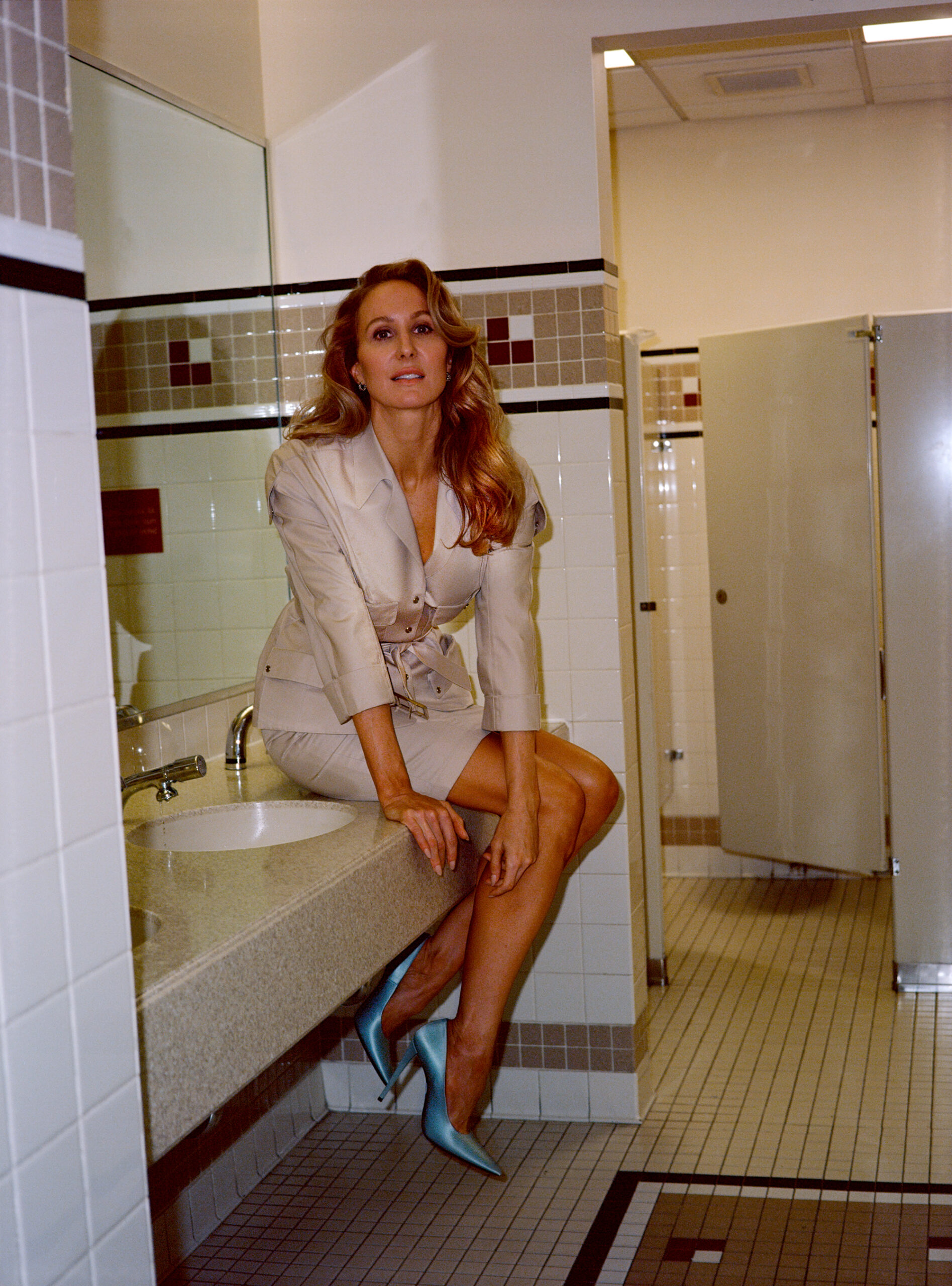
Vintage Thierry Mugler Jacket and Skirt TheRealList on 1stDibs. Earrings Cartier. Shoes Stylist’s Own.
———
Hair: Akihisa Yamaguchi using Oribe and Amika Hair Tools at Forward Artists.
Makeup: Rommy Najor using Make Up For Ever at Foward Artists.
Nails: Nori using Chanel Le Vernis at See Management.
Set Design: Selena Liu.
Photography Assistant: Gabriella Spiegel.
Fashion Assistant: Nicholson Baird.
Production Assistant: Kiernan Francis.
Location: Splashlight Studios.

